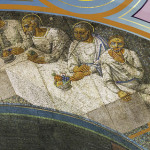We run our website the way we wished the whole internet worked: we provide high quality original content with no ads. We are funded solely by your direct support. Please consider supporting this project.

Does the Open View Undermine God’s Sovereignty?
A common objection to the concept of a risk-taking God is that it seems to undermine God’s sovereignty. If any particular individual can opt out of God’s plan, then every individual could conceivably opt out of God’s plan, and it seems that God’s entire plan for world history could ultimately fail.
Some have argued that if God is not in control of everything, then something must be in control of him which is, they argue tantamount to saying that God does not exists. R. C. Sproul put it this way, “If there is any part of creation outside of God’s sovereignty, then God is simply not sovereign. If God is not sovereign, then God is not God.” If anything is not controlled by God, everything is in jeopardy it seems.
My perspective offers two challenges to this view of sovereignty.
1. An adventurous sovereignty. First, the objection that God is not sovereign unless he controls everything assumes that sovereignty is synonymous with unilateral control. But why should we accept this understanding of divine sovereignty? There are no rational or biblical reasons to suppose that divine sovereignty must or should entail exhaustive, meticulous, divine control.
Can we not conceive of a God who is so great that he dares to create agents who can, to some extent, make autonomous decisions? Can we not conceive of a God who might choose to experiment and risk? Why should we not assume that this is the case—especially since Scripture itself indicates that God does at times experience surprise and disappointment.
Indeed, can we not imagine God growing tired of controlling, or simply foreknowing, everything in meticulous detail from all eternity? If we who are made in God’s image naturally desire a healthy element of novelty, risk and adventure, why should we assume that the opposite is true of God? Conversely, if the total absence of novelty, adventure and spontaneity would be torture for us, why should we assume it is heaven for God?
2. The undermining of divine sovereignty. The definition of sovereignty as control is not only unwarranted; it is, for many of us, not sovereign at all. To speak frankly, it is hard to conceive of a weaker God than one who would be threatened by events occurring outside of his meticulous control. It is difficult to imagine a less majestic view of God than one who is necessarily limited by a unilateral, deterministic mode of relating to his creation.
The central problem with this conception of sovereignty is that there is nothing intrinsically praiseworthy about sheer power. Praise has to do with character. What is praiseworthy about God’s sovereignty is not that he exercises a power he obviously has but that out of his character he does not exercise all the power he could.
Using an analogy from our common experience, I submit that a truly great leader who is sovereign over his kingdom in the most exalted fashion is a leader secure enough in the influence of his leadership and the character he possesses that he does not need to resort to coercion. Moreover, in this light, I contend, the omni-controlling understanding of divine sovereignty must be judged as actually constituting a denial of divine sovereignty.
—Adapted from Satan and the Problem of Evil, 146-150.
Image by Drew Patrick
Category: Q&A
Tags: Determinism, Divine Foreknowledge, Free Will, God's Sovereignty, Open Theism
Topics: Providence, Predestination and Free Will, Responding to Objections
Related Reading

Why God Sometimes “Can’t”
Greg continues his thoughts on sickness and spiritual warfare by addressing the question of why God “can’t” intervene in some circumstances of illness.

The Open View of Messianic Prophesies
Image by Lawrence OP via Flickr A number of passages speak of particular events being foreknown by God, even events resulting from individuals’ free will. For example, dozens of prophesies in the OT accurately predict details about the coming Messiah (e.g., he would be born in Bethlehem; arise out of the lineage of Abraham; be executed with…

The Risk of Love
The most basic and yet most profound teaching of the Bible is that “God is love” (1 Jn 4:8; 16). He is revealed to be a God who is triune—Father, Son and Holy Spirit (See Mt 3:16; 28:19, Jn 14:26; 15:26)—who’s very essence is an eternal, loving relationship. He created the world out of love…

What is the significance of Jeremiah 3:19–20?
“I thought how I would set you among my children…And I thought you would call me, My Father, and would not turn from following me. Instead, as a faithless wife…you have been faithless to me…” If the future is eternally and exhaustively settled, and if God therefore knows it as such, he could not have…

Podcast: Is an Open Future World a Logically Possible World?
Greg gets technical in this abstract, yet profound, introduction to an open theist’s interpretation of the square of opposition. http://traffic.libsyn.com/askgregboyd/Episode_0217.mp3

What’s the significance of Isaiah 63:8-10?
The Lord said (or “thought”) to himself, “Surely they are my people, chidren who will not deal falsely.” So, the text says, “He became their savior” (Isa. 63: 8). But “they rebelled and grieved his holy spirit.” So the Lord “became their enemy” (9-10). If the future is exhaustively settled from all eternity, how could…
